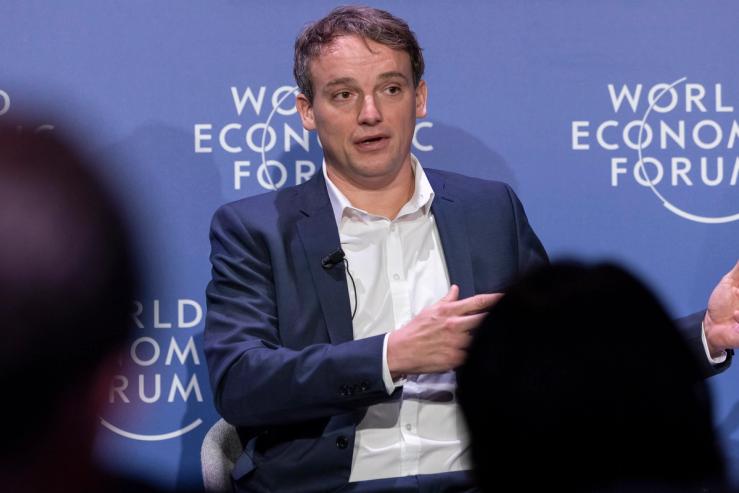The Scene
Just six months after Christian Klein became SAP’s sole CEO in April 2020, he watched its shares plunge by 30%. The historic drop came in response to news that the German enterprise technology stalwart was pulling its five-year financial guidance, as pandemic pressures lingered and customers embarked on a margin-threatening shift away from on-premise software, which had been SAP’s lucrative forte.
Five years later, Klein is celebrating an achievement that seemed implausible at the time: In March, SAP became Europe’s most highly valued company, having leapfrogged the likes of Novo Nordisk, LVMH, and ASML. Its market capitalization, at roughly $360 billion, is still just one-tenth that of Microsoft’s, and Novo has been jostling for the lead again. But it shows that investors are buying into Klein’s story that the 53-year-old legacy tech company can be a leader in the disruptive era of cloud computing and artificial intelligence.
In this article:
The Signal Interview
“It’s super important to see that the market, especially on AI, feels SAP is a vital player,” Klein says of his stock’s recent rally. Even so, he has a cautious message to employees: “Please stay humble. That is one milestone, but things can change… We have to prove to ourselves every day that we can innovate.”
Klein grew up close to SAP’s Walldorf headquarters, an hour south of Frankfurt, and first worked for the company as a 15-year-old intern. After joining its staff in 1999, he was mentored by several leading executives before being appointed to the top job at 40. But even a company man could see “100%” that AI posed an existential threat.
If SAP did not embed this new technology into its offerings for sales, marketing, finance, and other corporate functions, “no one would buy our software anymore,” he says, adding that it has been easier to make that case to staff now than when he was pushing for its cloud transformation in 2020. Seeing the power of the new technology, most realized it was “the right thing to do, to bet SAP big-time on business AI.”
Transformation will face resistance
Klein describes the challenge he faced five years ago as a classic innovator’s dilemma: SAP needed to disrupt itself by turning its back on a highly profitable traditional business if it was to compete in the new world. The pivot that he believes did most to revalue SAP in the eyes of the market was also the most difficult one to make, he says. “The most bold decision was [to say], ‘Hey, our financials don’t fit anymore. We need to say goodbye to €4 billion of profits for the time being.’ And then it becomes a little bit tricky.”
Hasso Plattner, the SAP co-founder who chaired its supervisory board at the time, was “disappointed” but supportive, Klein says, telling the new CEO: “Even in such a crisis, you need to see this as an opportunity and deliver on your strategy.”
Klein felt the pressure, and at first, he met resistance from shocked developers, salespeople, consultants, and customers who were reluctant to change how they had worked for years. “You have to over-communicate a lot, because you need to turn everyone — almost everyone — into a believer, otherwise it won’t work,” Klein notes.
At the same time, Klein was having to establish his own authority. He had been appointed co-CEO alongside Jennifer Morgan, the former head of SAP’s cloud business group, when Bill McDermott left after a decade as CEO in October 2019. The partnership structure was not unprecedented for SAP, but fell apart unusually quickly.
The pandemic was a factor, Klein says, noting that SAP needed to “make very critical decisions very fast,” and that was difficult when he was in Germany and Morgan was in the US. But there were also “fundamental question marks” where the two differed on product strategy. By April 2020, Morgan was out, and SAP said it was putting Klein solely in charge “to ensure strong, unambiguous steering in times of an unprecedented crisis.”
There has been more turnover in his executive team since then, with SAP’s chief revenue officer, chief marketing officer, and chief technology officer all leaving last year. Klein says he has tried to bring in a variety of perspectives — SAP insiders and outsiders from different cultural and geographic backgrounds — and wanted people who were “in this together.”
“If everyone has their own ego, then it won’t work,” he says. “It’s also about the personality of the people and how they stick together, especially in challenging times.”
Ideas beyond the ivory tower
Klein calls himself “a child of SAP,” acknowledging that his lack of external experience can be viewed in two ways. “Some people say, ‘Oh, Christian has only seen SAP so far in his career,’” he says: “I see it, of course, as rather a positive.” He has been studying its culture since he was lugging equipment around as an intern, and has spent years meeting its customers, partners, and shareholders. Without that knowledge, he says, “honestly, I don’t believe that I could have managed this transformation.”
Still, he tries to keep broadening his experience by getting out of his “ivory tower” in Walldorf to meet clients calculating how tariffs may hit their IT budgets and students working on quantum computing. None of the inspiration for the changes he has made over the past five years came to him unprompted, he says: “You need to be out there to get these ideas.”
He has also been out “educating” customers about how SAP can help them as AI upends their own businesses. SAP has the advantage of long-term relationships, counting 98 of the world’s 100 largest companies among its clients, he notes. His pitch is that SAP can embed new AI agents into the core business processes that it already runs for them, integrating tasks like supply chain management and procurement, rather than leaving customers to choose from “hundreds of niche solutions that [are] not talking to each other.”
AI tools such as Joule, its generative AI copilot, have become the biggest driver of new business wins for SAP, Klein says, predicting that they will make users of its software 30% more productive within the year.
100,000 employees meet the ‘digital workforce’
AI productivity promises come with tough questions about the technology’s implications for employment. Last July, SAP cited “AI-driven efficiencies” as one reason for a restructuring that could cost up to 10,000 jobs. Klein says a “digital workforce” is already taking on some of his 100,000-plus employees’ tasks, but hedges his answer on how secure the latter’s positions are.
“Of course, it would be a lie to say, ‘Oh, nothing will change.’ I’m sure you’ll need less of certain jobs you have today,” he says, while noting that SAP is staffing up in areas like data science and research. The outlook for its headcount is already “underproportional” to its growth, he says, but he doesn’t see the mass displacement of human labor that some CEOs have warned of.
“Yes, some jobs will disappear, but… other jobs will come,” Klein says. A new generation of interns will be among them: SAP’s record of bringing talent in early, including PhD students, gives it valuable access to new perspectives and technological insights, he says.
Europe risks ‘a big mistake’
Thirty years after his own internship, Klein has had his contract as CEO extended until 2030. And the head of Europe’s most valuable company is getting more involved in the continent’s debates about how to create tech companies that can compete against the strongest US and Chinese rivals in the coming years.
Like most of his peers, he urges the EU to avoid over-regulation, which he says drives companies “crazy” just when they need to be moving fast. But he differs from some other CEOs in that he believes it would be “a big mistake” to concentrate on building more data centers in Europe.
“A piece of a data center doesn’t make Mercedes or BMW more competitive. What these companies need is software,” he says, arguing that Europe should focus on helping the industries where it already excels apply AI to transform themselves faster.
The pressure to do so has been compounded by the threat of US tariffs on companies in Europe and beyond. Some customers are telling Klein that uncertainty about how trade wars will affect their suppliers, costs, and customers is leading them to hold back on IT spending. Others are buying his pitch — that they need SAP’s software to sharpen their supply chain planning. “So we have both things,” he says. But “if we are going into a recession because tariffs stay, everyone will suffer.”
Klein says he had more sleepless nights in 2020 than today, but his experience in the intervening years taught him a lesson: “Stay humble. Don’t celebrate your success and think, ‘OK, now for the next 10 years, we can just continue to do what we do.’ No, no, the world is changing.”
Notable
- Klein was among a number of CEOs who called for Europe to invest massively in AI, after the US’ $500 billion Stargate project was announced.
- SAP’s success with AI and the subsequent bump in the company’s stock drove a 165% increase in Klein’s pay last year, compared to 2023.
- Klein has been critical of Europe’s cloud data center ambitions, saying it was “completely crazy” to try to compete with American hyperscalers, which had already invested in the region.


